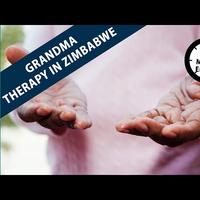Grandma therapy in Zimbabwe - 6 Minute English - YouTube
Hello. This is 6 Minute English
from BBC Learning English. I'm Neil.
And I'm Sam.
Sam, have you ever heard the expression
'a problem shared is a problem halved'?
Yes, Neil, I have. Doesn't it mean that
people often feel better
after talking about their
problems with someone?
Right - in this programme we'll be hearing
the extraordinary story of how these ideas
were taken up by a team of community
grandmothers in Zimbabwe.
Zimbabwe has over 14 million people
but fewer than 20 psychiatrists.
After years of economic
turmoil, unemployment and HIV, mental
health is a huge challenge,
and doctors estimate
that one in four Zimbabweans
suffers from depression or anxiety.
When it proved impossible to find free
space to use in hospitals,
psychiatrist Dr Dixon
Chibanda, came up with the idea of
turning public park benches
into spaces for therapy.
He recruited grandmothers, who have
both free time and plenty
of life experience, to talk
with individuals struggling with mental
health issues like depression,
anxiety, and trauma.
The grandmothers are drawn from
the local community and
trained over several weeks in
a talking therapy called CBT - but
what does that abbreviation, CBT,
stand for? That's
my quiz question. Is it:
a) Chatting Based Therapy?,
b) Conversation
Brain Therapy? or,
c) Cognitive Behavioural Therapy?
Well, I think I'll say c) Cognitive
Behavioural Therapy.
OK, Sam, we'll find out later. Now,
although the recent history of
Zimbabwe has left millions
struggling with mental health issues,
at the start of his project, Dr Dixon
Chibanda was
the only psychiatrist working in
public health in the whole country.
And as well as a lack of provision, many
villagers were suspicious
of talking therapy, preferring
to rely on traditional faith healers instead.
Which is why when Kim Chakanetsa,
of BBC World Service's
The Documentary Podcast, spoke to
Dr Dixon Chibanda, she started by asking
him whether people were
supportive of his idea:
Initially there was a lot of scepticism,
a lot of resistance, particularly
from colleagues
who thought this was not evidence-based,
and it wasn't going to work.
The whole idea of
training grandmothers - I mean, this has
not been done anywhere else
in the world so naturally
there was resistance.
Were you at all apprehensive?
I was, to be quite honest.
At first, Dr Dixon Chibanda's ideas were
met with scepticism - an attitude
of doubting
whether something is useful or true.
'Grandma benches' were a totally new
idea, never seen before anywhere
in the world and
so his colleagues naturally felt some
resistance - refusal to accept a change
or new idea.
Which left Dr Dixon Chibanda feeling
a little apprehensive - worried
that something bad
was going to happen to his project.
Fortunately, as it turned out, Dr Dixon
Chibanda's apprehensions were
wrong. Grandmothers are
highly respected in Zimbabwean society
and as they started listening,
people began opening
up and telling their stories.
The 'grandma benches' have empowered
over 50,000 people to deal with
their life problems
and Dr Dixon Chibanda even has plans to
move his idea online, giving
the world access to
a virtual Friendship Bench.
Here he is again, explaining on the
BBC World Service's The Documentary
Podcast why he believes
his ideas have been so successful:
It works because it's simple, it's cheap
and it's run by communities,
particularly grandmothers
who are in essence a resource
in African communities - you know,
they are the custodians of local
culture and wisdom - that's why is works,
and I guess, it does away
with western concepts
which remove the stigma that is normally
associated with mental illness.
Clients are willing to share their problems
with the grandmother-therapists
because they
are respected as cultural custodians -
people with responsibility for taking
care of something
or trying to protect ideas or principles,
in this case local customs and wisdom.
This helps do away with - or remove - the
stigma attached to mental health - strong
feelings of shame or disapproval which
most members of a community
have towards something,
such as psychological illness.
For Zimbabweans suffering domestic
violence, unemployment and
dealing with HIV, having
a grandmother to talk to really can
change their perceptions about
how problems can be
managed.
So it seems true that 'a problem shared
is a problem halved', which
reminds me of our
quiz question, Sam.
Yes. You asked me what the talking
therapy abbreviated to CBT
stands for. And I said
c) Cognitive Behavioural Therapy.
Which is absolutely right! CBT - a way of
managing problems by changing
ways of thinking
and behaving.
So this week we've been hearing the
inspiring story of Zimbabwean
Dr Dixon Chibanda's 'grandma
bench' therapy - an idea which was
initially met with scepticism - a
doubtful attitude,
and resistance - refusal to change
and accept new ideas.
Dr Dixon Chibanda's feelings of
apprehension - worries that
the project would fail, proved
false when his team of grandmother
therapists were treated as
custodians - or protectors,
of wisdom and life experience who really
could help people suffering
depression, poverty
and trauma.
The success of the project helped do
away with - or remove - strong
feelings of shame
or disapproval felt by many people
regarding mental health, known
as stigma. To hear more
inspiring, topical stories, join us again
soon here at 6 Minute English.
Bye for now!
Goodbye!

